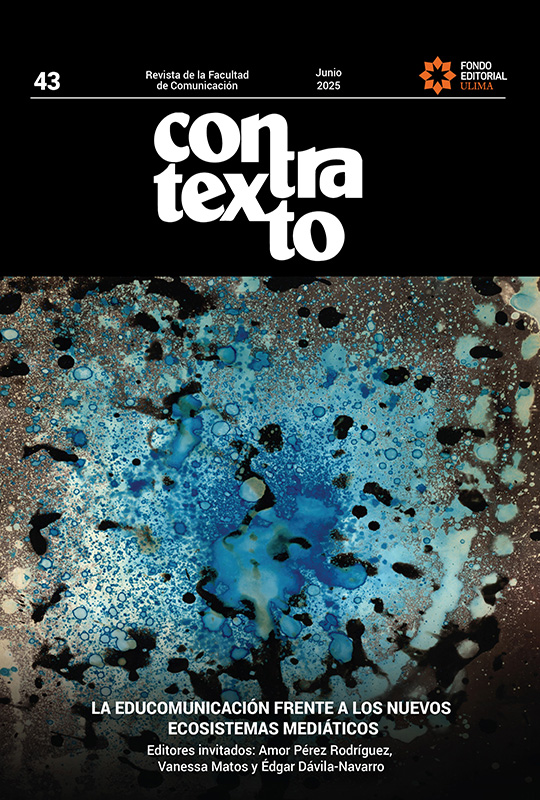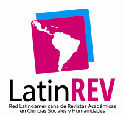Production of educational resources for media education in schools: teachers’ perceptions and needs
DOI:
https://doi.org/10.26439/contratexto2025.n44.7919Keywords:
media education, digital and media literacy, school and teachers, teacher training, educational resourcesAbstract
The relevance of media education has been increasingly recognized in the international context as well as in Portugal. Particular attention is given to children and young people, placing considerable responsibility on schools and teachers to contribute, from an early age, to the development of informed citizens, effective communicators, and active participants in the digital culture. The primary objective of the research conducted was to understand the perceptions of primary and secondary school teachers regarding media education and their role, as well as the role of the school, in promoting students’ digital and media literacy. Additionally, the study sought to examine teachers’ training and needs in this area, thereby gathering useful information to guide the development of educational resources. Following a non-experimental and descriptive methodology, based on data obtained from an online questionnaire created by the research team, it was concluded that teachers place great importance on media education, recognize the role of the school and themselves in students’ development, but also state that they have insufficient training in this field. Based on these results, two educational resources were developed: a book and a mobile application, designed to support teachers in addressing the challenge of implementing media education in schools.
Downloads
References
Aguaded, I., Jaramillo-Dent, D., & Delgado-Ponce, A. (Coords.). (2021). Currículum Alfamed de formación de professores en educación mediática. MIL (Media and Information Literacy) en la era pos-COVID-19. Octaedro.
Arciniega Cáceres, M., & Figueras-Maz, M. (2019). La educación mediática y el uso de los recursos tecnológicos en el aula en el contexto iberoamericano. Contratexto, (32), 19-39. https://doi.org/10.26439/contratexto2019.n032.4604
Buckingham D. (2003). Media education: Literacy, learning and contemporary culture. Polity.
Buckingham, D. (2019). The media education manifesto. Polity Press.
Comissão Europeia. (2009). Recomendação da comissão de 20 de agosto de 2009 sobre literacia mediática no ambiente digital para uma indústria audiovisual e de conteúdos mais competitiva e uma sociedade do conhecimento inclusiva. Jornal Oficial da União Europeia, L 2227, 9-12. https://eur-lex.europa.eu/LexUriServ/LexUriServ.do?uri=OJ:L:2009:227:0009:0012:PT:PDF
Conselho da União Europeia. (2020). Conclusões do conselho sobre a literacia mediática num mundo em constante mutação (2020/C 193/06). Jornal Oficial da União Europeia, 2020/C 193/06, 23-28. https://eur-lex.europa.eu/legal-content/EN/TXT/?uri=CELEX%3A52020XG0609%2804%29
Conselho Nacional de Educação. (2011). Recomendação n.º 6/2011 - Recomendação sobre educação para a literacia mediática. https://diariodarepublica.pt/dr/detalhe/recomendacao/6-2011-3478279
Direção Geral de Educação. (2017b). Estratégia Nacional de Educação para a Cidadania. Ministério de Educação http://dge.mec.pt/sites/default/files/Projetos_Curriculares/Aprendizagens_Essenciais/estrategia_cidadania_original.pdf
European Commission/EACEA/Eurydice. (2019). Digital education at school in Europe. Eurydice Report. Publications Office of the European Union.
Ferrés, J., & Piscitelli. A. (2012). La competencia mediática: propuesta articulada de dimensiones e indicadores. Comunicar, 19(38), 75-82.
Fortin, M. F. (2003). O processo de investigação: da concepção à realização. Lusociência.
Frau-Meigs, D. (2006). Media education: A kit for teachers, students, parents and professionals. Unesco.
García-Ruiz, R., Matos, A., Arenas-Fernández, A., & Ugalde, C. (2020). Alfabetización mediática en educación primaria. Perspectiva internacional del nivel de competencia mediática Pixel-BIT. Revista de Medios y Educación, (58), 217-236. https://doi.org/10.12795/pixelbit.74535
Gould, H., Von Gillern, S., Korona, M., & Haywood, A. (2024). ELA and social studies teachers’ perspectives on the importance of media literacy for student learning. Journal of Media Literacy Education, 16(3), 45-61. https://doi.org/10.23860/JMLE-2024-16-3-4
Grizzle, A., Moore, P., Dezuanni, M., Asthana, S., Wilson, C., Banda, F., & Onumah, C. (2013). Media and information literacy: Policy and strategy guidelines. Unesco.
Grizzle, A., Wilson, C., Tuazon, R., Cheung, C. K., Lau, J., Fischer, R., Gordon, D., Akyempong, K., Singh, J., Carr, P. R., Stewart, K., Tayle, S., Suraj, O., Jaakkola, M., Thésée, G., & Gulston, C. (Eds.). (2021). Media and information literate citizens: Think critically, click wisely! Unesco.
Gutiérrez, A., & Tyner, K. (2012). Media education, media literacy and digital competence. Comunicar, 19(38), 31-39. http://dx.doi.org/10.3916/C38-2012-02-03
International Commission on the Futures of Education. (2022). Reimaginar nossos futuros juntos. Um novo contrato social para a educação. Unesco.
Jolls, T., & Wilson, C. (2014). The core concepts: Fundamental to media literacy yesterday, today and tomorrow. Journal of Media Literacy Education, 6(2), 68-78. http://dx.doi.org/10.23860/JMLE-2016-06-02-6
Lei 74/2020 de 2020. A presente lei transpõe para a ordem jurídica interna a Diretiva (UE) 2018/1808 do Parlamento Europeu e do Conselho, de 14 de novembro de 2018, que altera a Diretiva 2010/13/UE. Diário da República n.º 226/2020, Série I de 2020-11-19, 4-34. 19 de novembrode 2020.
Martens, H., & Hobbs, R. (2015). How media literacy supports civic engagement in a digital age. Atlantic Journal of Communication, 23(2), 120-137. http://dx.doi.org/10.1080/15456870.2014.961636
Mateus, J.-C., Andrada, P., & Ferrés, J. (2019). Evaluar la competencia mediática: una aproximación crítica desde las perspectivas pedagógica, política y metodológica. Revista de Comunicación, 18(2), 287-301. https://doi.org/10.26441/RC18.2-2019-A14
Mateus, J. C., & Hernández, W. (2019). Design, validation, and application of a questionnaire on media education for teachers in training. Journal of New Approaches in Educational Research, 8(1), 34-41. https://doi.org/10.7821/naer.2019.1.329
Matos, A. P. M., Festas, I., Seixas, A. M., Bobrowicz-Campos, E., Pereira, S., Lopes, P., Tomé, V., Beça, A., Camponez, C., Moreira, A., & Brites, L (2023). Educação para os media em prática. Imprensa da Universidade de Coimbra. https://doi.org/10.14195/978-989-26-2542-3
Parlamento Europeu e Conselho da União Europeia. (2018). Diretiva (UE) 2018/1808 do Parlamento Europeu e do Conselho de 14 de novembro de 2018. Jornal Oficial da União Europeia, L 303/69.
Pereira, S., Pinto, M., & Madureira, E. J. (2023). Referencial de Educação para os Media. Direção-Geral da Educação.
Pinto, M., & Pereira, S. (2018). Experiências, perceções e expectativas da formação de professores em educação para os media em Portugal. Revista Interuniversitaria de Formación del Profesorado, 32(91, fasc. 1), 83-103.
Potter, W. J. (2021). Media literacy (10th ed.). Sage
Resolução do Conselho de Ministros 142/2023 [Presidência do Conselho de Ministros]. Aprova as Linhas Orientadoras do Plano Nacional de Literacia Mediática. 17 de novembro de 2023.
Resolução do Conselho de Ministros 105/2024 [Presidência do Conselho de Ministros]. Cria a Estrutura de Missão para a Comunicação Social. 21 de agosto de 2024.
Romero-Rodríguez, L. M., Contreras-Pulido, P., & Pérez-Rodríguez, M. A. (2019). Media competencies of university professors and students. Comparison of levels in Spain, Portugal, Brazil and Venezuela. Cultura y Educación/Culture and Education, 31(2), 326-368. https://doi.org/10.1080/11356405.2019.1597564
Scheibe C., & Rogow F. (2012). The teacher’s guide to media literacy: Critical thinking in a multimedia world. Corwin.
Schmitz, M. L., Gonon, P., Consoli, T., & Petko, D. (2024). Why do some teachers teach media literacy while others do not? Exploring predictors along the “will, skill, tool, pedagogy” model. Computers in Human Behavior, 151, 1-11. https://doi.org/10.1016/j.chb.2023.108004
Share, J., Mamikonyan, T., & Lopez, E. (2023). Critical media literacy in teacher education, theory, and practice. Oxford Research Encyclopedia of Education. https://oxfordre.com/education/display/10.1093/acrefore/9780190264093.001.0001/acrefore-9780190264093-e-1404
Simons, M., Meeus, W., & T’Sas, J. (2017). Measuring media literacy for media education: Development of a questionnaire for teachers’ competencies. Journal of Media Literacy Education, 9(1), 99-115.
Van Deursen, A., & Van Dijk, J. (2010). Internet skills and the digital divide. New Media & Society, 13(6), 893-911. https://doi.org/10.1177/1461444810386774
Downloads
Published
Issue
Section
License
All of the works published are licensed under a CC BY 4.0 Creative Commons Attribution license. (updated on March 1st 2021)
The content of the journal may be shared in any material or format. The content may be adapted, contributed upon and transformed. Both possibilities are only permitted in so far as they complete the following conditions:
- Attribution: Credit must be given where it is due, a link to the license must be provided and changes, if made, must be indicated. This should be done in the manner deemed appropriate, without suggesting that the licensor promotes you or your use of the material.
Ownership rights
The patrimonial rights for Contratexto are published under a Creative Commons BY 4.0 license, allowing authors to keep the patrimonial rights to their work without restrictions.
If a work published in Contratexto were to be copied, distributed, spread, or any other activities contemplated in the aforementioned license, the author(s) and the journal must be mentioned visibly and expressly.
Self-archive
This journal allows and encourages authors to post items submitted to the journal on personal websites or institutional repositories both prior to and after publication, while providing bibliographic details that credit, if applicable, its publication in this journal.

















